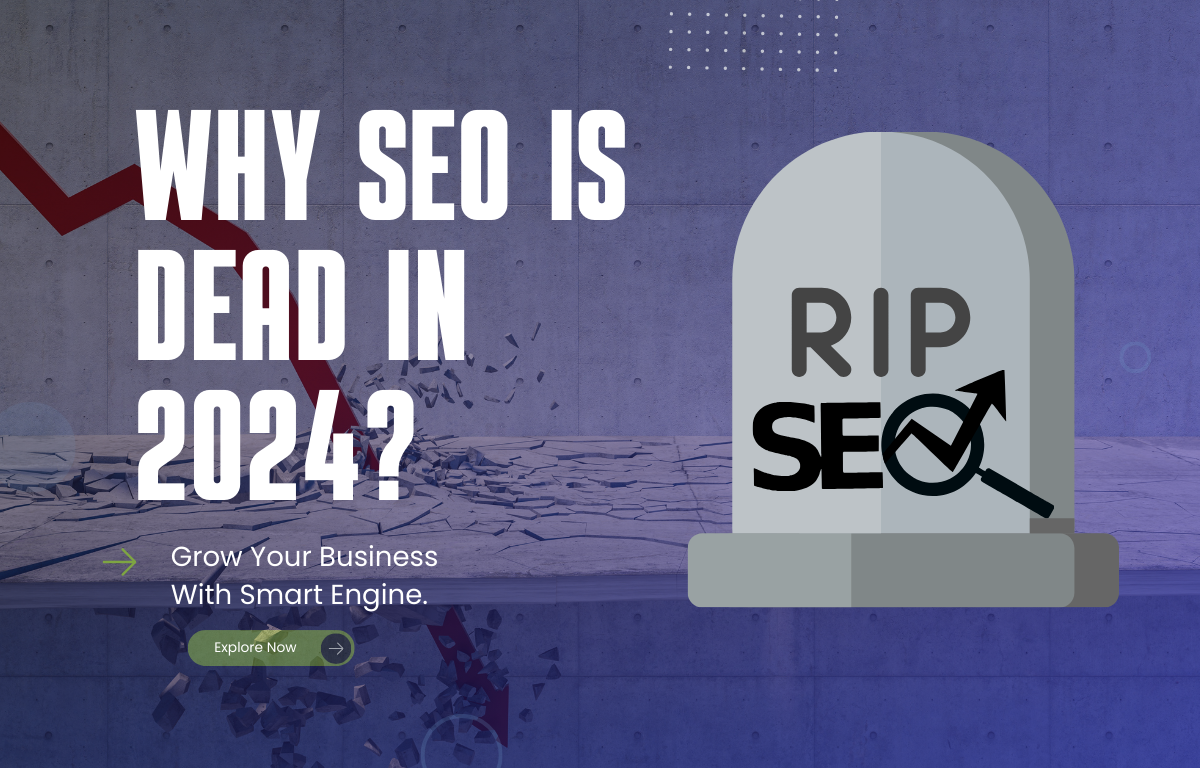
Posted On : 28-08-2024 16:55:00
The question "Is SEO dead in 2024?" may sound dramatic, but it's one that many businesses and digital marketers are pondering as the digital landscape continues to evolve rapidly. Search Engine Optimization (SEO) has been a cornerstone of digital marketing for over two decades, but with constant changes in technology, search engine algorithms, and user behavior, it's crucial to evaluate its relevance and effectiveness in today's context.
Table of Content:
To determine whether SEO is dead, we first need to understand how it has evolved. SEO began as a straightforward practice focused on optimizing web pages for specific keywords to rank higher in search engine results pages (SERPs). Over the years, however, SEO has transformed significantly due to several key factors:
1. Algorithm Updates: Search engines like Google have continuously updated their algorithms to improve search result quality and user experience. Major updates like Google Panda, Penguin, Hummingbird, and BERT have shifted SEO from a keyword-focused approach to a more holistic one that considers content quality, user intent, and website authority.
2. User Experience (UX): Modern SEO is no longer just about keywords. It encompasses aspects of user experience, including site speed, mobile-friendliness, and user engagement. Google and other search engines prioritize websites that offer a superior user experience, which has become integral to effective SEO strategies.
3. Content Quality: Quality content has become a central pillar of SEO. Search engines increasingly prioritize content that provides real value to users, answers their queries comprehensively, and engages them. This shift has led to the rise of content marketing as a crucial component of SEO.
4. Voice Search and AI: The advent of voice search and artificial intelligence has introduced new dimensions to SEO. Search queries are becoming more conversational, and optimizing for voice search requires a different approach than traditional text-based SEO. AI technologies, like Google's RankBrain, have also changed how search engines interpret and rank content.
Despite these changes, SEO is far from dead. In fact, it remains a vital component of digital marketing for several reasons:
1. Continued Search Engine Usage: Search engines are still the primary tool users employ to find information, products, and services online. Google, Bing, and other search engines handle billions of queries daily, and businesses that want to be visible to potential customers must invest in SEO to compete effectively.
2. Search Engine Algorithms: While search engine algorithms have become more sophisticated, they still rely on core SEO principles. High-quality content, relevant keywords, and authoritative backlinks continue to play significant roles in ranking well. Understanding and adapting to these algorithms is crucial for maintaining a strong online presence.
3. Local SEO Importance: For local businesses, SEO is especially critical. Local SEO helps businesses appear in local search results, Google Maps, and other location-based queries. This localized approach drives traffic to physical stores and boosts local brand awareness.
4. Competitive Advantage: In a crowded digital marketplace, effective SEO can provide a significant competitive edge. Businesses that invest in SEO are better positioned to capture organic traffic, build brand credibility, and generate leads without relying solely on paid advertising.
While SEO is certainly not dead, it is evolving. The future of SEO in 2024 and beyond will likely be shaped by several emerging trends:
1. AI and Machine Learning: AI and machine learning will continue to influence SEO strategies. Search engines will become better at understanding user intent and context, making it essential for businesses to focus on creating content that addresses users' needs comprehensively. AI-driven tools will also enhance SEO analytics, helping marketers refine their strategies with greater precision.
2. Voice and Visual Search: As voice search and visual search technologies become more prevalent, optimizing for these formats will become increasingly important. Businesses will need to adapt their SEO strategies to accommodate natural language processing and image recognition, ensuring their content is accessible and relevant in these new search paradigms.
3. Mobile-First Indexing: With the majority of searches now occurring on mobile devices, Google has adopted a mobile-first indexing approach. This means that the mobile version of a website is prioritized in search rankings. Ensuring a seamless mobile experience will be crucial for maintaining and improving search visibility.
4. E-A-T (Expertise, Authority, Trustworthiness): Google's emphasis on E-A-T will continue to shape SEO practices. Websites that demonstrate expertise, authority, and trustworthiness in their content will be favored in search results. This means that businesses must focus on building their authority in their respective niches and providing high-quality, credible information.
5. User-Centric SEO: SEO strategies will increasingly prioritize user experience. This includes optimizing for page load speeds0, ensuring easy navigation, and delivering content that is engaging and relevant. The goal will be to create a positive experience for users while meeting search engine criteria.
In summary, SEO is not dead in 2024. Instead, it has evolved and continues to be a fundamental aspect of digital marketing. As search engines and user behaviors change, SEO practices must adapt to stay relevant. By focusing on high-quality content, user experience, and emerging technologies, businesses can leverage SEO to enhance their online visibility, attract targeted traffic, and achieve their digital marketing goals.
So, while the landscape of SEO is undoubtedly different from its early days, it remains an indispensable tool for any business looking to thrive in the digital age. Embracing these changes and staying informed about the latest trends will ensure that your SEO efforts remain effective and aligned with the evolving online environment.
Copyright 20-2025 Jaimru Technology Private Limited | All Rights Reserved.